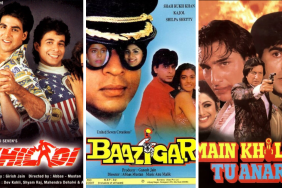
James Franco‘s As I Lay Dying is a film to be respected more for its filmmaking vision rather than its resulting narrative. In adapting William Faulkner‘s 1930 novel Franco has managed to capture the nuts and bolts of the story, utilizing split-screen to add more information to almost every scene. But as the film rolls along, and the curiosity in function goes away and the story is doing very little to entertain or engage, you can’t help but ask yourself, “Why am I watching this?”
The story follows the Bundren family in the aftermath of the death of Addie (Beth Grant), the family matriarch. Her wish is to be laid to rest in Jefferson, Mississippi and her family obliges in their own selfish and misunderstood ways, but the path to Jefferson with Addie stowed in a coffin on the back of a horse-drawn wagon proves treacherous to say the least.
An attempt to ford a river is a catastrophe, resulting in a loss of tools, broken leg and lowered spirits all around. As their travels continue we will learn of a pregnancy in the family, a fire will start and the time it’s taking to get Addie to town is resulting in a putrid smell coming from her pine wood box. In short, things could be going better.
Among those on this journey, we’ll begin with Addie’s widower, Anse Bundren. Played with a gaping mouth and rotten teeth by Tim Blake Nelson, Anse chews over sentences only half of which can truly be understood. The pack of four Bundren brothers are made up of Cash, the eldest of the lot played by “True Blood” co-star Jim Parrock, Logan Marshall-Green plays Jewel, the youngest of the brothers, Brady Permenter plays young Vardaman while Franco steps in as Darl, the second eldest son of the family and the primary focus of the film if there is to be one. Dewey Dell is the the family’s only daughter and the final member of the Bundren clan played by Ahna O’Reilly.
Franco’s screenplay is sure to include everyone mentioned above, some more than others and a couple I haven’t mentioned as he sticks to Faulkner’s storytelling technique in allowing the characters to also narrate portions of the story. However, this narration isn’t typical in that it doesn’t always advance the story as much as add bits of ambiguous insight into each character. It’s in these moments his decision to use split-screen really stands out as a character’s face may take up one whole side of the screen as the action continues to play out on the other. It’s a cleverly fascinating technique, it’s just unfortunate the final product doesn’t end up any better.
For all the impressive filmmaking going on, the film is largely a tedious dud. We watch as a family suffers a journey none of them truly wish to be on and in the process we realize we have even less interest in tagging along. The broken leg suffered by Cash becomes a major plot point just as does Dewey Dell’s unwanted pregnancy, but neither are all that compelling and Dewey Dell’s pregnancy seems to come along later in the film as more of an afterthought, rather than a well-developed aspect of the overall film.
In all, it’s tough to figure out why Franco felt like telling this story. None of the characters are all that interesting or standout over the other and the story seems itself doesn’t appear to offer anything profound. The most I can gather is the intent was to further Franco’s filmmaking talent as yet another experimental film in his rather unique filmography. I’d be curious, however, to know where he plans on going with this?
Is it wrong to wonder if he’ll ever make something a little more mainstream or traditional? Would that only prove to handcuff a filmmaker who appears to be establishing his own personal cinematic voice, be it good or bad?
As I Lay Dying only appears experimental largely due to the amount of split-screen he uses and a few visual flourishes here and there that are more art house than anything you’d see in today’s multiplexes. Yet, once the film is moving along it isn’t as if it’s loaded with visual metaphors, so over the top only true cinephiles will “get” what’s going on, though it still isn’t something the masses would ever turn out for.
In the end, I didn’t much care for the film, but I respected the effort.









